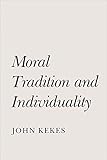Moral Tradition and Individuality / John Kekes.
Material type: TextPublisher: Princeton, NJ : Princeton University Press, [2022]Copyright date: ©1989Description: 1 online resource (260 p.)Content type:
TextPublisher: Princeton, NJ : Princeton University Press, [2022]Copyright date: ©1989Description: 1 online resource (260 p.)Content type: - 9780691223025
- Ethics
- Individuality
- Satisfaction
- Tradition (Philosophy)
- PHILOSOPHY / Political
- Annas, Julia
- Aristotle
- Berlin, Isaiah
- Brookner, Anita
- Callisthenes
- Fingarette, Herbert
- Foot, Philippa
- James, Henry
- Kantianism
- Knox, Bernard
- appeal
- autonomy
- benevolence
- breadth
- civic friendship
- coherence
- complex moral situations
- conservatism
- conventions
- defeasible commitments
- double-mindedness
- enforcement of social morality
- external goods
- good and evil
- good judgment
- happiness
- human limitations
- human welfare
- incommensurability
- integrity
- interpretation
- latitude
- liberalism
- loose commitments
- modern sensibility
- moral horror
- naturalism
- objectivism
- objectivity
- perfection
- personal satisfaction
- pluralism
- principles
- realism
- reflective purity
- self-condemnation
- simple moral situations
- sympathy
- tests of good lives
- utilitarianism
- virtues
- voluntarism
- BJ1531
- online - DeGruyter
| Item type | Current library | Call number | URL | Status | Notes | Barcode | |
|---|---|---|---|---|---|---|---|
 eBook
eBook
|
Biblioteca "Angelicum" Pont. Univ. S.Tommaso d'Aquino Nuvola online | online - DeGruyter (Browse shelf(Opens below)) | Online access | Not for loan (Accesso limitato) | Accesso per gli utenti autorizzati / Access for authorized users | (dgr)9780691223025 |
Frontmatter -- Contents -- Acknowledgments -- Introduction -- Chapter One. Objectivity and Horror in Morality -- Chapter Two. Beyond Choice: The Grounds of Moral Disapproval -- Chapter Three. The Great Guide of Human Life -- Chapter Four. Decency -- Chapter Five. A Defense of Social Morality: Intuition of Simple Moral -- Chapter Six. Self-Direction in Complex Moral Situations -- Chapter Seven. Good Judgment -- Chapter Eight. Moral Reflection and Conflict -- Chapter Nine. Moral Perspectives -- Chapter Ten. The Goods of Good Lives -- Chapter Eleven. The Justification of Eudaimonism -- Chapter Twelve. The Integrity and Purity of Good Lives -- Works Cited -- Index
restricted access online access with authorization star
http://purl.org/coar/access_right/c_16ec
In this study, John Kekes develops the view that good lives depend on maintaining a balance between one's moral tradition and individuality. Our moral tradition provides the forms of good lives and the permissible ways of trying to achieve them. But to do so, the author argues, we must grow in self-knowledge and self-control to make our characters suitable for realizing our aspirations. In addressing general readers as well as scholars, Kekes makes these philosophical views concrete by drawing on a rich variety of literary sources, including, among others, the works of Sophocles, Henry James, Tolstoy, and Edith Wharton. The first half of the work concentrates on social morality, establishing the conditions all good lives must meet. The second discusses personal morality, the sphere of individuality. Its development enables us to discover what is important to us and how we can fit our personal aspirations into the forms of life our moral tradition provides. Kekes's argument derives its inspiration from Aristotle's objectivism, Hume's emphasis on custom and feeling, and Mill's concentration on individuals and their experiments in living. This book is a nontechnical yet closely reasoned attempt to provide a contemporary answer to the age-old question of how to live well.
Mode of access: Internet via World Wide Web.
In English.
Description based on online resource; title from PDF title page (publisher's Web site, viewed 29. Jun 2022)


